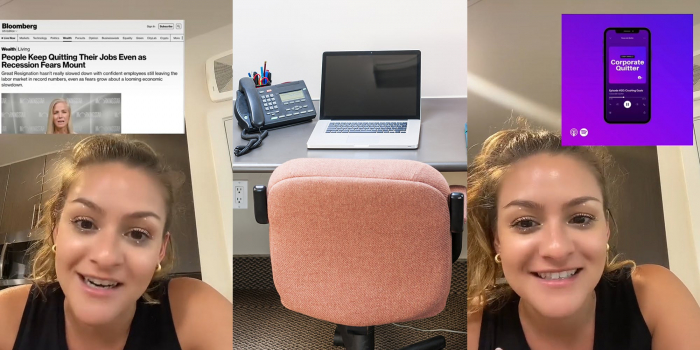Even years into the Great Resignation, workers continue to leave their jobs in droves. While plenty of employees are still sending off official resignation emails to bosses, younger workers are increasingly taking a different tack: live quitting.
In July 2021, a clip of UK McDonald’s workers quitting mid-shift went viral – and now TikTok is awash with users sharing real-time footage of the moment they told their bosses ‘I quit’. Sometimes tense, often funny and nearly always compelling, these short video clips are attracting thousands – sometimes millions – of views on the social media platform.
What’s driving the #quittok trend?
What’s happening?
Though these #quittok videos take different forms – filming workers’ departures on a live Zoom call, or documenting the second they turn in a letter of resignation – each clip captures the real-time moment when workers quit.
In September 2022, Christina Zumbo, 31, a now-former Australian government worker, shared the moment she clicked send on her resignation email, and waited anxiously for a video call from her boss. Zumbo, who had already shared glimpses of work-related mental health struggles with her 140,000 TikTok followers, said she felt others on the platform would relate to the post.
“I really struggled with making this decision to leave, feeling like I was letting my team and manager down, and the thought of being without work without something lined up, into a tumultuous job market at the time,” she says. “I decided to share this journey online because it simply isn’t talked about enough.”
But even she was surprised by the overwhelming response, with 53,000 likes and nearly 3,000 comments on the short clip. “I had no idea so many people would see, relate and share their own stories – or their fear of leaving their current workplace, or their strong desire to do what I did,” says Brisbane-based Zumbo. “It’s always surprising in the best way, the sense of community you feel if you open yourself up to showing real, relatable vulnerability online.”
Marisa Jo Mayes, too, had been using TikTok as a “fun, creative outlet”, sharing content as a way of “fighting [her] unhappiness at work”, when she decided to live-quit her job with a medical device company.
“I had a nice paycheque, got to travel and worked with some of the biggest names in the industry, but I was completely miserable,” says the 29-year-old, based in Arizona, US. “I was in the deepest burnout of my life, couldn't think about anything besides work and was struggling with stress-induced health issues.”
Mayes’s 30-second clip shows her in the tense moments leading up to a call with her boss – and then her immediate relief. ‘It’s like an elephant foot off my chest, but I’m also sad,’ she captioned the video.
Two years after it was first shared in late 2020, it’s still one of the most viewed #quittok moments, with more than 200,000 likes as of this writing. Sharing the moment on the platform felt natural, says Mayes. “It wasn't really a conscious decision to make a video, as it was just something that was part of my routine. I had been sharing a lot of my self-development journey, so it felt like a natural thing to share, since it was such a huge life event.”
Responses, though, were a mix: “From ‘OMG congrats you’re living my dream’, to ‘You’re just an entitled millennial who deserves to be unemployed’,” she says. Despite being shocked by the strong feelings her post provoked, most of the feedback was overwhelmingly positive – prompting Mayes to continue to share her self-development journey in the years since. “The negative comments didn't stop me from continuing to post about my experience post-corporate – because for every one person angry about it, there are probably 10 inspired by it.”
What’s driving this?
The majority of young users on TikTok have grown up as digital natives, sharing every kind of milestone online. To some extent, says California-based therapist and coach Tess Brigham, it’s natural they’d also share private conversations with employers about their decision to quit.
“It's how this generation has experiences, it's how they've learned to be in the world,” she says. “If you grow up used to recording and sharing things, why wouldn't you share these larger, more significant moments in time?”
But there’s also a more fundamental change in attitudes that underpins the #quittok trend, she believes.
Millennials and Gen Z watched their parents struggle in corporate jobs during the 2008 economic crash, and some of these young people are mired in student debt with low-paying jobs themselves. They’ve also had their early work experiences shaped by Covid-19, with the youngest workers never even having stepped a foot inside an office. These stressors combined, says Brigham, have meant younger workers – particularly Gen Z – are prioritising mental health, happiness and positive work environments. As a result, they see content that depicts people quitting ‘toxic workplaces’ and standing up to unfair bosses as deeply aspirational.
This rings true for Zumbo, who’s seen a big shift in work-life balance and priorities since Covid-19. “I think it’s important to take control of our lives, and be actively on the path we want to be on, instead of walking along one we don’t want to be on or don’t know any better,” she says. “Sharing quitting my job online, and reflecting on making big career decisions is important to show that you are in control of your own happiness, you make the decisions for your life and a job is just a job sometimes – not your whole identity.”
What does this mean?
The long-term implications of live quitting and posting #quittok videos aren’t exactly clear, says Brigham. For instance, there’s no way to predict how these posts might affect future career opportunities.
However, while we’re still finding out, the #quittok trend has the potential to encourage transparency in the corporate world, she believes.
More about:















































